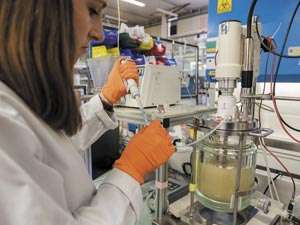A new innovation platform tackles market gaps in the food and personal care sectors

A*STAR is set to launch its Biotransformation Innovation Platform (BioTrans), a multidisciplinary taskforce that will harness the power of microorganisms to transform cheap and sustainable carbon sources into chemical compounds of interest to the biotechnology industry.
Biotransformation occurs when anything from microorganisms to human beings transform a chemical substance by consuming it. An example of this is the industrial production of antibiotics using the natural capacity of filamentous fungi to convert simple sugars into life-saving drugs. Another example in line with BioTrans' activities can be seen in the use of genetically modified yeasts to produce the sugar substitute, Stevia, which tastes significantly more natural than the version stocked on supermarket shelves, based on natural plant extracts. Scientists like Nic Lindley, director of BioTrans, are eager to investigate biotransformation as a production method for high-value chemical compounds required by the food and personal care sectors, which are difficult to synthesize through traditional methods.
The scent of success
The food and personal care sector has seen positive growth in recent years, with the global market for fragrances and perfumes alone predicted to exceed US$40 Billion by 2020. The sector relies heavily on plants and animals as raw material for their products, but changing land-use patterns are forcing companies to look for sustainable alternatives to chemical synthesis.
With the opening of BioTrans, A*STAR is well positioned to contribute to this emerging market opportunity. To produce bioalternatives, researchers must first tease out the genetic elements involved in the synthetic pathway of the target molecule and use that information to create—via metabolic engineering and synthetic biology—a 'cell factory' capable of producing economically viable concentrations of the target molecule. The snag in this process is ensuring that the cellular strains created in the laboratory are tough enough to perform under the harsh fermentation conditions typical in industrial processes. When cells succumb to the pressure, a common occurrence, the entire project is sent back to the drawing board. BioTrans' approach is to build strain robustness into the design from the project outset. This model of early-stage innovation sets the platform apart, says Lindley, and will help to speed up passage through the pipeline.
BioTrans researchers will provide a much-needed link between research and industry. "We aim to bridge the gap between what can be done in our laboratories and bring it to commercial success, thereby contributing to reinforcing the Singapore economy on this important domain," explains Lindley.
Greater than the sum of its parts
Lindley was looking for a new challenge when Kenneth Lee, head of the Food Nutrition and Consumer Care cluster at the A*STAR Biomedical Research Council and the founding director of BioTrans, contacted him in May 2015. For the previous 12 years Lindley had led a systems biology and engineering laboratory in Toulouse, France. The opportunity to lead a small, dynamic team at the forefront of the junction between science and industry was too attractive to pass up.
In the year since his encounter with Lee, Lindley has prepared BioTrans for its official launch, enlisting staff and developing state-of-the-art technologies, including techniques for analyzing volatile compounds, an automated taste-screening platform, advanced fermentation processes and molecular tools for engineering proteins and metabolites. "While the technological toolbox in BioTrans is important, the real strength is the people willing to move into this complex environment and learn how to work with the disciplines," says Lindley, praising the enthusiastic group of 25 scientists who have joined the platform either as collaborators based in other A*STAR institutes or as full-time staff. And the team is growing fast.
But BioTrans' strongest selling point is the collective intelligence approach adopted by the program, Lindley says. "We thrash out ideas together before fixing on a coordinated project built up from the various skills which can be articulated to do something no individual scientist would imagine on his own." Some early projects the team has begun to work on involve generating stress-resistant microbial strains and testing the potential for creating new flavors and fragrances.
Closer collaborations with industrial partners will follow from the 2 August launch. Lindley and his team are ready to hit the ground running, "even more enthusiastic for the project now than I was at the beginning."


















